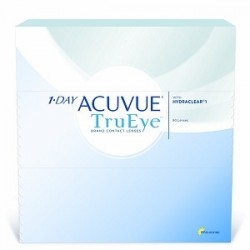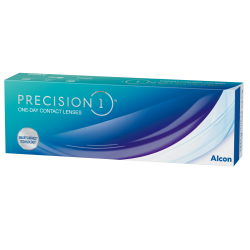What Happens If You Wear Contacts Past 30 Days?

As simple as it sounds to remove your contacts nightly or to follow your disposal schedule, it can be really hard to do – just like washing your face. But there are repercussions to wearing contacts longer than it is recommended. You should know that there are some contacts designed to last for more than a month – such as RGP lenses. But you would have to follow some care regimen if you want to ensure proper eye health. You are also still required to remove the contact lenses every night and keep them in their lens case for moisturizing. This is a guide that will explain what happens if you wear contacts past 30 days, the repercussions of passing the contact’s expiration date, and some care tips.
Why Not to Use Monthly Contacts Longer
These are some reasons not to wear contact lenses for more than the designated monthly wear.
Proteins start to build up.
You might not realize it, but the tears you produce can have a significant impact on the comfort and clarity of your contact lenses. These tears contain certain proteins that can stick to the surface of your lenses, leading to discomfort and reduced visual acuity over time.
Further, it’s not just crying that can cause this problem. Your eyes are constantly producing tears to protect themselves from dirt, debris, and other harmful substances. These tears act as a natural cleanser, keeping your eyes clear and healthy. However, as tear protein deposits build up on your lenses, they can become less comfortable and start to develop a cloudy appearance, making it harder to see clearly.
If you wear contact lenses, it’s essential to keep this in mind. The buildup of tear proteins on your lenses is a gradual process, and it can be easy to ignore the early signs of discomfort and cloudiness. But ignoring these signs can lead to more significant problems down the line, including eye infections and even vision loss.
Don’t take any chances with your eye health. Take proactive steps to keep your contact lenses clean and comfortable, and dispose it when required. Using extended wear contact lenses for more than 30 days is too costly to be taken likely.
Pits and scratches can develop, giving bacteria and viruses a zone to grow.
Overwearing your contact lenses can have severe consequences, and it’s not just discomfort and irritation that you should be worried about. The scariest concern is the potential for bacteria and viruses to grow on your eye, leading to a range of devastating outcomes.
If left unchecked, these pathogens can cause irreparable damage, leading to the loss of vision or even the loss of the eye itself. Imagine waking up one day, only to find that your eye has become infected and that you may never see clearly again. This nightmare scenario is all too real for those who neglect the proper care of their contact lenses.
Don’t let this happen to you. Take the necessary precautions to keep your eyes safe and healthy. Follow the recommended wearing time for your contact lenses and never ignore any signs of discomfort or irritation. Remember, your eyes are precious, and they deserve the best possible care.
Enough oxygen won’t get through as easily.
Did you know that your eyes also need to breathe, just like your lungs? Oxygen is essential for all cells in your body, including your corneas – the clear domes covering the colored part of your eyes. However, unlike other organs, corneas do not have any blood vessels, which means they have to rely mostly on the air for oxygen supply.
Thankfully, there are contact lenses with a unique molecular structure that allows water and oxygen to pass through without compromising its ability to transmit oxygen. This lens, called Night & Day Lenses is free to move around your eye, ensuring a constant supply of oxygen to your cornea, and preventing that dreaded feeling of sticky eyes.
However, though these contact lenses are designed to allow oxygen to pass through, it’s important to follow the disposal schedule. The lens material gradually breaks down over time, reducing its ability for oxygen transmissibility. This reduction in oxygen permeability can lead to discomfort and even eye infections when the recommended wearing time is exceeded.
So, remember to give your eyes a break and let them breathe! Stay away from overnight wear and dispose of them properly to ensure healthy and comfortable vision.
Any other hazards I should know about wearing contact lenses after expiration date?

Following instructions about monthly contacts can drastically save your eye. Here are some other things to note:
You could get Bacterial keratitis
As a contact lens wearer, you should know that if you wear monthly contacts past the time ou are supposed to, it raises your risk of a bacterial infection that can cause symptoms similar to a scratched cornea. This risk increases if you wear your contacts overnight or don’t care for them properly, as bacteria can get trapped between the lens and your eye. If left untreated, this infection can lead to vision loss.
Allergic pink eye (giant papillary conjunctivitis).
An allergic reaction to something in the eye can cause the eyelid to become rough, red, swollen, and bumpy inside. This condition is more common in contact lens wearers, especially those who wear soft contact lenses and don’t replace them often enough. Don’t ignore these symptoms – seek medical attention immediately to prevent further damage to your eyes.
Scratched cornea (corneal abrasion).
Even the edge of an overused contact lens can scratch the surface of your eye, causing pain, redness, sensitivity to light, and a headache. If left untreated, this can lead to infection and inflammation. Don’t hesitate – contact your eye doctor immediately or seek emergency care to prevent further damage to your eye.
What happens to the contact lens if you wear them longer?
Contact lens manufacturers designed contacts to last for a specific time. Overwearing would also affect the lens itself. Here are some things that could happen.
Ill-fitting lenses
Do you remember the last time you put in a fresh pair of soft contact lenses and felt absolutely nothing? That’s because today’s lenses are so well-designed that they’re almost unnoticeable! But, if you keep wearing your lenses past their recommended replacement schedule, they can become distorted and cause discomfort, irritation, and even pain. So, to keep your eyes happy and healthy, make sure to switch out your lenses as recommended by your eye doctor!
Tearing the lenses
While contact lenses are generally durable, they can still tear, especially as they age and become more delicate. If a lens tears in your hand, it’s a minor inconvenience that can be quickly remedied. However, if a lens tears in your eye, it’s a whole different story. You could be facing serious discomfort, potential infection, and a risk to your vision.
Dirty lenses
While cleaning your biweekly and monthly lenses is important, no solution can remove all deposits. As they accumulate, your vision can become cloudy and the lenses can even become toxic, leading to discomfort and serious infection. Don’t let dirty lenses get in the way of your vision – make sure to take proper care of them.
Check some of our products:

1-DAY ACUVUE TRUEYE (90)
The 1-day Acuvue TruEye is a disposable contact lenses designed for people who want to keep their eyes healthy without the ...

ACUVUE OASYS with Transitions
ACUVUE® OASYS with Transitions Can’t stand sunny days and computer tasks any longer? Well, we can’t blame you; constantl...

Biofinity Toric 3 contact lenses
Biofinity Toric 3 contact lenses online Biofinity Toric lenses from CooperVision are the ideal solution for astigmatism corre...

Precision 1 Daily contact lenses
Precision 1-DAY 30 contact lenses by Alcon are a leading product in the market, known for their comfort, high-quality vision,...
How long can you wear contact lenses before replacing them with a new pair?

Daily disposable contact lenses should typically not be worn for more than 14 hours in one day, while biweekly lenses should not be worn for more than 14 days. Monthly lenses are a popular option for contact lens wearers, but it’s important to follow the manufacturer’s recommended wear time and replace them accordingly. Although it may be tempting to keep wearing your contacts past their recommended replacement date, doing so can lead to the accumulation of harmful deposits and proteins. To avoid this, consider setting a reminder on your phone or downloading an app to keep track of when it’s time to replace your lenses.
See also:






